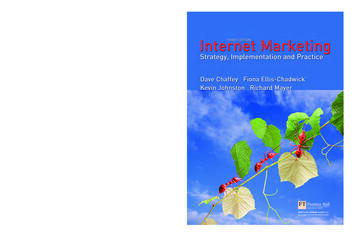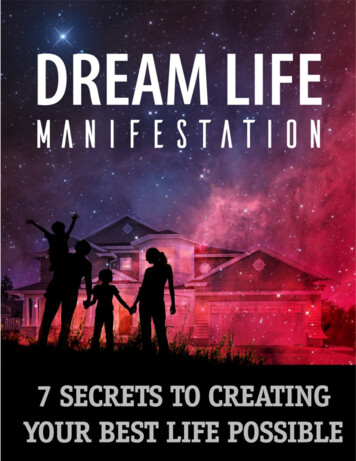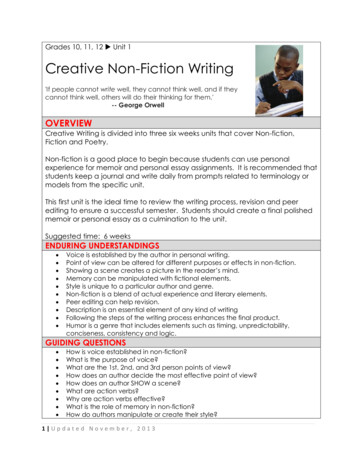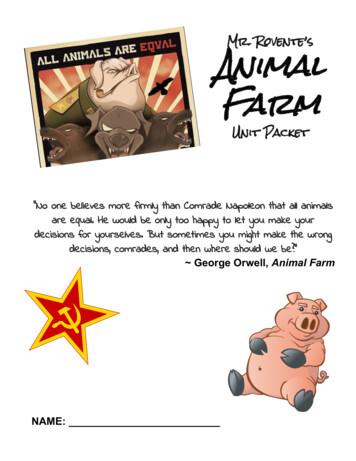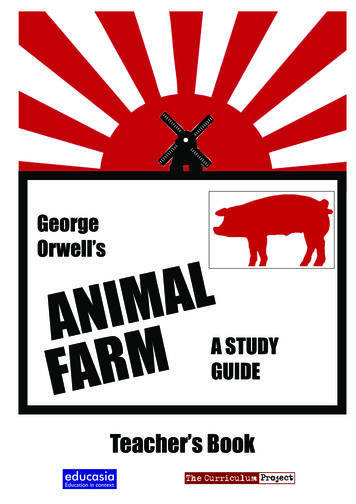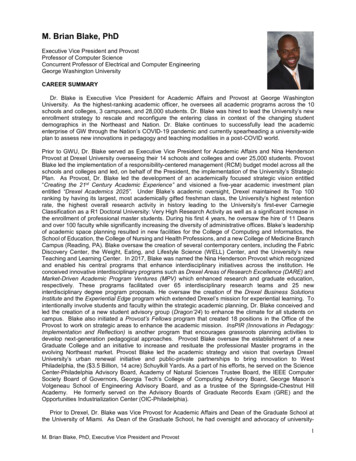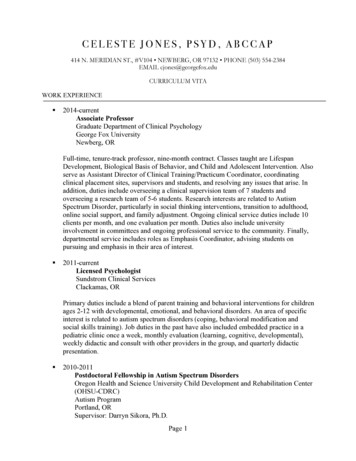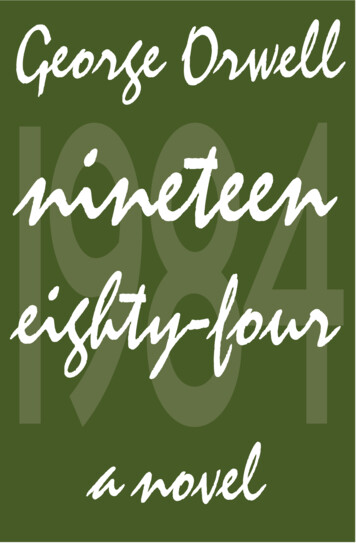
Transcription
George Orwell1984nineteeneighty-foura novel
NINETEEN EIGHTY-FOURERIC ARTHUR BLAIR was born in British India in 1903, the son of a Civil Servantworking in the Opium Department. He attended Eton, but his family could notpay for university, so in 1922 he joined the Indian Imperial Police. He came tohate imperialism, and when he returned to England in 1927 he decided to resignand become a writer. In the spring of 1928, he moved to Paris, hoping to make aliving as a freelance writer. His lack of success reduced Blair to taking menialjobs as a dishwasher for a few weeks, principally in a fashionable hotel (theHotel X), which he later described in his fi rst book, Down and Out in Paris andLondon. Ill and penniless, he moved back to England in 1929. Writing whatbecame Burmese Days, he made frequent forays into tramping as part of whathad by now become a book project on the life of the poorest people in society.Blair completed Down and Out in 1932, and it was published early the nextyear. Blair adopted the pen name George Orwell just before Down and Out waspublished. In early 1936, Orwell was commissioned to write an account ofpoverty among the working class in the depressed areas of northern England,which appeared in 1937 as The Road to Wigan Pier. He was taken into manyhouses, simply saying that he wanted to see how people lived. Soon aftercompleting his research for the book, Orwell married Eileen O’Shaughnessy. InDecember 1936, Orwell travelled to Spain to fi ght for the Republican sideagainst Fascists. Orwell sympathetically describes the egalitarian spirit ofrevolutionary Barcelona when he arrived in Homage to Catalonia. Hisexperiences, in particular his and his wife’s narrow escape from the Communistpurges in Barcelona in June 1937, made him a life-long anti-Stalinist and a fi rmbeliever in what he termed Democratic Socialism.Orwell took a job at the BBC Eastern Service in 1941, supervising broadcasts toIndia aimed at stimulating Indian interest in the war effort. He was well awarethat he was engaged in propaganda, and wrote that he felt like “an orange that’sbeen trodden on by a very dirty boot”. Despite the good salary, he resigned inSeptember 1943. In 1944, Orwell fi nished his anti-Stalinist allegory AnimalFarm. The royalties from Animal Farm were to provide Orwell with acomfortable income for the fi rst time in his adult life. During 1945, while Orwellwas sick in Cologne, Eileen died in Newcastle during surgery. For the next fouryears Orwell mixed journalistic work with writing his best-known work,Nineteen Eighty-Four, which was published in 1949. In October 1949, shortlybefore his death, he married Sonia Brownell.
GEORGE ORWELLNineteen Eighty-Four
Title: Nineteen Eighty-FourAuthor: George Orwell (pseudonym of Eric Blair) (1903–1950)A Project Gutenberg of Australia eBook, typeset by readng.comeBook No.: 0100021.txtLanguage: EnglishDate fi rst posted: August 2001Date most recently updated: August 2001Project Gutenberg of Australia eBooks are created from printed editions whichare in the public domain in Australia, unless a copyright notice is included. Wedo NOT keep any eBooks in compliance with a particular paper edition.Copyright laws are changing all over the world. Be sure to check the copyrightlaws for your country before downloading or redistributing this fi le.This eBook is made available at no cost and with almost no restrictionswhatsoever. You may copy it, give it away or re-use it under the terms of theProject Gutenberg of Australia License which may be viewed online athttp://gutenberg.net.au/licence.htmlTo contact Project Gutenberg of Australia go to http://gutenberg.net.au/To contact readng.com, go to
PART ONEChapter 1It was a bright cold day in April, and the clocks were strikingthirteen. Winston Smith, his chin nuzzled into his breast in aneffort to escape the vile wind, slipped quickly through the glassdoors of Victory Mansions, though not quickly enough to preventa swirl of gritty dust from entering along with him.The hallway smelt of boiled cabbage and old rag mats. At oneend of it a coloured poster, too large for indoor display, had beentacked to the wall. It depicted simply an enormous face, morethan a metre wide: the face of a man of about forty-fi ve, with aheavy black moustache and ruggedly handsome features. Winstonmade for the stairs. It was no use trying the lift. Even at the bestof times it was seldom working, and at present the electric currentwas cut off during daylight hours. It was part of the economydrive in preparation for Hate Week. The flat was seven flights up,and Winston, who was thirty-nine and had a varicose ulcer abovehis right ankle, went slowly, resting several times on the way. Oneach landing, opposite the lift-shaft, the poster with the enormousface gazed from the wall. It was one of those pictures which are socontrived that the eyes follow you about when you move. BIGBROTHER IS WATCHING YOU, the caption beneath it ran.Inside the flat a fruity voice was reading out a list of fi gureswhich had something to do with the production of pig-iron. Thevoice came from an oblong metal plaque like a dulled mirrorwhich formed part of the surface of the right-hand wall. Winstonturned a switch and the voice sank somewhat, though the wordswere still distinguishable. The instrument (the telescreen, it wascalled) could be dimmed, but there was no way of shutting it offcompletely. He moved over to the window: a smallish, frail fi gure,the meagreness of his body merely emphasized by the blue overalls which were the uniform of the party. His hair was very fair,his face naturally sanguine, his skin roughened by coarse soap andblunt razor blades and the cold of the winter that had just ended.Outside, even through the shut window-pane, the world lookedcold. Down in the street little eddies of wind were whirling dust5
and torn paper into spirals, and though the sun was shining andthe sky a harsh blue, there seemed to be no colour in anything,except the posters that were plastered everywhere. The blackmoustachio’d face gazed down from every commanding corner.There was one on the house-front immediately opposite. BIGBROTHER IS WATCHING YOU, the caption said, while thedark eyes looked deep into Winston’s own. Down at street levelanother poster, torn at one corner, flapped fi tfully in the wind,alternately covering and uncovering the single word INGSOC. Inthe far distance a helicopter skimmed down between the roofs,hovered for an instant like a bluebottle, and darted away againwith a curving flight. It was the police patrol, snooping intopeople’s windows. The patrols did not matter, however. Only theThought Police mattered.Behind Winston’s back the voice from the telescreen was stillbabbling away about pig-iron and the overfulfi lment of the NinthThree-Year Plan. The telescreen received and transmitted simultaneously. Any sound that Winston made, above the level of a verylow whisper, would be picked up by it, moreover, so long as heremained within the fi eld of vision which the metal plaque commanded, he could be seen as well as heard. There was of course noway of knowing whether you were being watched at any givenmoment. How often, or on what system, the Thought Policeplugged in on any individual wire was guesswork. It was evenconceivable that they watched everybody all the time. But at anyrate they could plug in your wire whenever they wanted to. Youhad to live — did live, from habit that became instinct — in theassumption that every sound you made was overheard, and,except in darkness, every movement scrutinized.Winston kept his back turned to the telescreen. It was safer;though, as he well knew, even a back can be revealing. A kilometre away the Ministry of Truth, his place of work, towered vastand white above the grimy landscape. This, he thought with a sortof vague distaste — this was London, chief city of Airstrip One,itself the third most populous of the provinces of Oceania. Hetried to squeeze out some childhood memory that should tell himwhether London had always been quite like this. Were therealways these vistas of rotting nineteenth-century houses, their6
sides shored up with baulks of timber, their windows patchedwith cardboard and their roofs with corrugated iron, their crazygarden walls sagging in all directions? And the bombed siteswhere the plaster dust swirled in the air and the willow-herbstraggled over the heaps of rubble; and the places where thebombs had cleared a larger patch and there had sprung up sordidcolonies of wooden dwellings like chicken-houses? But it was nouse, he could not remember: nothing remained of his childhoodexcept a series of bright-lit tableaux occurring against no background and mostly unintelligible.The Ministry of Truth — Minitrue, in Newspeak [Newspeakwas the offi cial language of Oceania. For an account of its structure and etymology see Appendix.] — was startlingly differentfrom any other object in sight. It was an enormous pyramidalstructure of glittering white concrete, soaring up, terrace after terrace, 300 metres into the air. From where Winston stood it wasjust possible to read, picked out on its white face in elegant lettering, the three slogans of the Party:WAR IS PEACEFREEDOM IS SLAVERYIGNORANCE IS STRENGTHThe Ministry of Truth contained, it was said, three thousandrooms above ground level, and corresponding ramifi cationsbelow. Scattered about London there were just three other buildings of similar appearance and size. So completely did they dwarfthe surrounding architecture that from the roof of VictoryMansions you could see all four of them simultaneously. Theywere the homes of the four Ministries between which the entireapparatus of government was divided. The Ministry of Truth,which concerned itself with news, entertainment, education, andthe fi ne arts. The Ministry of Peace, which concerned itself withwar. The Ministry of Love, which maintained law and order. Andthe Ministry of Plenty, which was responsible for economicaffairs. Their names, in Newspeak: Minitrue, Minipax, Miniluv,and Miniplenty.7
The Ministry of Love was the really frightening one. Therewere no windows in it at all. Winston had never been inside theMinistry of Love, nor within half a kilometre of it. It was a placeimpossible to enter except on offi cial business, and then only bypenetrating through a maze of barbed-wire entanglements, steeldoors, and hidden machine-gun nests. Even the streets leading upto its outer barriers were roamed by gorilla-faced guards in blackuniforms, armed with jointed truncheons.Winston turned round abruptly. He had set his features into theexpression of quiet optimism which it was advisable to wear whenfacing the telescreen. He crossed the room into the tiny kitchen.By leaving the Ministry at this time of day he had sacrifi ced hislunch in the canteen, and he was aware that there was no food inthe kitchen except a hunk of dark-coloured bread which had gotto be saved for tomorrow’s breakfast. He took down from theshelf a bottle of colourless liquid with a plain white label markedVICTORY GIN. It gave off a sickly, oily smell, as of Chinese ricespirit. Winston poured out nearly a teacupful, nerved himself fora shock, and gulped it down like a dose of medicine.Instantly his face turned scarlet and the water ran out of hiseyes. The stuff was like nitric acid, and moreover, in swallowingit one had the sensation of being hit on the back of the head witha rubber club. The next moment, however, the burning in his bellydied down and the world began to look more cheerful. He took acigarette from a crumpled packet marked VICTORY CIGARETTES and incautiously held it upright, whereupon the tobaccofell out on to the floor. With the next he was more successful. Hewent back to the living-room and sat down at a small table thatstood to the left of the telescreen. From the table drawer he tookout a penholder, a bottle of ink, and a thick, quarto-sized blankbook with a red back and a marbled cover.For some reason the telescreen in the living-room was in anunusual position. Instead of being placed, as was normal, in theend wall, where it could command the whole room, it was in thelonger wall, opposite the window. To one side of it there was ashallow alcove in which Winston was now sitting, and which,when the flats were built, had probably been intended to holdbookshelves. By sitting in the alcove, and keeping well back,8
Winston was able to remain outside the range of the telescreen, sofar as sight went. He could be heard, of course, but so long as hestayed in his present position he could not be seen. It was partlythe unusual geography of the room that had suggested to him thething that he was now about to do.But it had also been suggested by the book that he had justtaken out of the drawer. It was a peculiarly beautiful book. Itssmooth creamy paper, a little yellowed by age, was of a kind thathad not been manufactured for at least forty years past. He couldguess, however, that the book was much older than that. He hadseen it lying in the window of a frowsy little junk-shop in aslummy quarter of the town (just what quarter he did not nowremember) and had been stricken immediately by an overwhelming desire to possess it. Party members were supposed not to gointo ordinary shops (‘dealing on the free market’, it was called),but the rule was not strictly kept, because there were variousthings, such as shoelaces and razor blades, which it was impossible to get hold of in any other way. He had given a quick glanceup and down the street and then had slipped inside and boughtthe book for two dollars fi fty. At the time he was not conscious ofwanting it for any particular purpose. He had carried it guiltilyhome in his briefcase. Even with nothing written in it, it was acompromising possession.The thing that he was about to do was to open a diary. Thiswas not illegal (nothing was illegal, since there were no longer anylaws), but if detected it was reasonably certain that it would bepunished by death, or at least by twenty-fi ve years in a forcedlabour camp. Winston fi tted a nib into the penholder and suckedit to get the grease off. The pen was an archaic instrument, seldomused even for signatures, and he had procured one, furtively andwith some diffi culty, simply because of a feeling that the beautifulcreamy paper deserved to be written on with a real nib instead ofbeing scratched with an ink-pencil. Actually he was not used towriting by hand. Apart from very short notes, it was usual to dictate everything into the speak-write which was of courseimpossible for his present purpose. He dipped the pen into the inkand then faltered for just a second. A tremor had gone through his9
bowels. To mark the paper was the decisive act. In small clumsyletters he wrote:April 4th, 1984.He sat back. A sense of complete helplessness had descended uponhim. To begin with, he did not know with any certainty that thiswas 1984. It must be round about that date, since he was fairlysure that his age was thirty-nine, and he believed that he had beenborn in 1944 or 1945; but it was never possible nowadays to pindown any date within a year or two.For whom, it suddenly occurred to him to wonder, was he writing this diary? For the future, for the unborn. His mind hoveredfor a moment round the doubtful date on the page, and thenfetched up with a bump against the Newspeak word DOUBLETHINK. For the fi rst time the magnitude of what he hadundertaken came home to him. How could you communicatewith the future? It was of its nature impossible. Either the futurewould resemble the present, in which case it would not listen tohim: or it would be different from it, and his predicament wouldbe meaningless.For some time he sat gazing stupidly at the paper. The telescreen had changed over to strident military music. It was curiousthat he seemed not merely to have lost the power of expressinghimself, but even to have forgotten what it was that he had originally intended to say. For weeks past he had been making readyfor this moment, and it had never crossed his mind that anythingwould be needed except courage. The actual writing would beeasy. All he had to do was to transfer to paper the interminablerestless monologue that had been running inside his head, literallyfor years. At this moment, however, even the monologue haddried up. Moreover his varicose ulcer had begun itching unbearably. He dared not scratch it, because if he did so it always becameinflamed. The seconds were ticking by. He was conscious of nothing except the blankness of the page in front of him, the itching ofthe skin above his ankle, the blaring of the music, and a slightbooziness caused by the gin.10
Suddenly he began writing in sheer panic, only imperfectlyaware of what he was setting down. His small but childish handwriting straggled up and down the page, shedding fi rst its capitalletters and fi nally even its full stops:April 4th, 1984. Last night to the flicks. All war fi lms. Onevery good one of a ship full of refugees being bombedsomewhere in the Mediterranean. Audience much amusedby shots of a great huge fat man trying to swim away witha helicopter after him, fi rst you saw him wallowing alongin the water like a porpoise, then you saw him through thehelicopters gunsights, then he was full of holes and the searound him turned pink and he sank as suddenly as thoughthe holes had let in the water, audience shouting withlaughter when he sank. then you saw a lifeboat full ofchildren with a helicopter hovering over it. there was amiddle-aged woman might have been a jewess sitting up inthe bow with a little boy about three years old in her arms.little boy screaming with fright and hiding his headbetween her breasts as if he was trying to burrow right intoher and the woman putting her arms round him andcomforting him although she was blue with fright herself,all the time covering him up as much as possible as if shethought her arms could keep the bullets off him. then thehelicopter planted a 20 kilo bomb in among them terrifi cflash and the boat went all to matchwood. then there was awonderful shot of a child’s arm going up up up right upinto the air a helicopter with a camera in its nose musthave followed it up and there was a lot of applause fromthe party seats but a woman down in the prole part of thehouse suddenly started kicking up a fuss and shouting theydidnt oughter of showed it not in front of kids they didnt itaint right not in front of kids it aint until the police turnedher turned her out i dont suppose anything happened toher nobody cares what the proles say typical prole reactionthey never ——11
Winston stopped writing, partly because he was suffering fromcramp. He did not know what had made him pour out this streamof rubbish. But the curious thing was that while he was doing soa totally different memory had clarifi ed itself in his mind, to thepoint where he almost felt equal to writing it down. It was, henow realized, because of this other incident that he had suddenlydecided to come home and begin the diary today.It had happened that morning at the Ministry, if anything sonebulous could be said to happen.It was nearly eleven hundred, and in the Records Department,where Winston worked, they were dragging the chairs out of thecubicles and grouping them in the centre of the hall opposite thebig telescreen, in preparation for the Two Minutes Hate. Winstonwas just taking his place in one of the middle rows when twopeople whom he knew by sight, but had never spoken to, cameunexpectedly into the room. One of them was a girl whom heoften passed in the corridors. He did not know her name, but heknew that she worked in the Fiction Department. Presumably —since he had sometimes seen her with oily hands and carrying aspanner — she had some mechanical job on one of the novel-writing machines. She was a bold-looking girl, of about twenty-seven,with thick hair, a freckled face, and swift, athletic movements. Anarrow scarlet sash, emblem of the Junior Anti-Sex League, waswound several times round the waist of her overalls, just tightlyenough to bring out the shapeliness of her hips. Winston had disliked her from the very fi rst moment of seeing her. He knew thereason. It was because of the atmosphere of hockey-fi elds andcold baths and community hikes and general clean-mindednesswhich she managed to carry about with her. He disliked nearly allwomen, and especially the young and pretty ones. It was alwaysthe women, and above all the young ones, who were the most bigoted adherents of the Party, the swallowers of slogans, theamateur spies and nosers-out of unorthodoxy. But this particulargirl gave him the impression of being more dangerous than most.Once when they passed in the corridor she gave him a quick sidelong glance which seemed to pierce right into him and for amoment had fi lled him with black terror. The idea had evencrossed his mind that she might be an agent of the Thought Police.12
That, it was true, was very unlikely. Still, he continued to feel apeculiar uneasiness, which had fear mixed up in it as well as hostility, whenever she was anywhere near him.The other person was a man named O’Brien, a member of theInner Party and holder of some post so important and remote thatWinston had only a dim idea of its nature. A momentary hushpassed over the group of people round the chairs as they saw theblack overalls of an Inner Party member approaching. O’Brienwas a large, burly man with a thick neck and a coarse, humorous,brutal face. In spite of his formidable appearance he had a certaincharm of manner. He had a trick of resettling his spectacles on hisnose which was curiously disarming — in some indefi nable way,curiously civilized. It was a gesture which, if anyone had stillthought in such terms, might have recalled an eighteenth-centurynobleman offering his snuffbox. Winston had seen O’Brien perhaps a dozen times in almost as many years. He felt deeply drawnto him, and not solely because he was intrigued by the contrastbetween O’Brien’s urbane manner and his prize-fi ghter’s physique.Much more it was because of a secretly held belief — or perhapsnot even a belief, merely a hope — that O’Brien’s political orthodoxy was not perfect. Something in his face suggested itirresistibly. And again, perhaps it was not even unorthodoxy thatwas written in his face, but simply intelligence. But at any rate hehad the appearance of being a person that you could talk to ifsomehow you could cheat the telescreen and get him alone.Winston had never made the smallest effort to verify this guess:indeed, there was no way of doing so. At this moment O‘Brienglanced at his wrist-watch, saw that it was nearly eleven hundred,and evidently decided to stay in the Records Department until theTwo Minutes Hate was over. He took a chair in the same row asWinston, a couple of places away. A small, sandy-haired womanwho worked in the next cubicle to Winston was between them.The girl with dark hair was sitting immediately behind.The next moment a hideous, grinding speech, as of some monstrous machine running without oil, burst from the big telescreenat the end of the room. It was a noise that set one’s teeth on edgeand bristled the hair at the back of one’s neck. The Hate hadstarted.13
As usual, the face of Emmanuel Goldstein, the Enemy of thePeople, had flashed on to the screen. There were hisses here andthere among the audience. The little sandy-haired woman gave asqueak of mingled fear and disgust. Goldstein was the renegadeand backslider who once, long ago (how long ago, nobody quiteremembered), had been one of the leading fi gures of the Party,almost on a level with Big Brother himself, and then had engagedin counter-revolutionary activities, had been condemned to death,and had mysteriously escaped and disappeared. The programmesof the Two Minutes Hate varied from day to day, but there wasnone in which Goldstein was not the principal fi gure. He was theprimal traitor, the earliest defi ler of the Party’s purity. All subsequent crimes against the Party, all treacheries, acts of sabotage,heresies, deviations, sprang directly out of his teaching.Somewhere or other he was still alive and hatching his conspiracies: perhaps somewhere beyond the sea, under the protection ofhis foreign paymasters, perhaps even — so it was occasionallyrumoured — in some hiding-place in Oceania itself.Winston’s diaphragm was constricted. He could never see theface of Goldstein without a painful mixture of emotions. It was alean Jewish face, with a great fuzzy aureole of white hair and asmall goatee beard — a clever face, and yet somehow inherentlydespicable, with a kind of senile silliness in the long thin nose,near the end of which a pair of spectacles was perched. It resembled the face of a sheep, and the voice, too, had a sheep-likequality. Goldstein was delivering his usual venomous attack uponthe doctrines of the Party — an attack so exaggerated and perversethat a child should have been able to see through it, and yet justplausible enough to fi ll one with an alarmed feeling that otherpeople, less level-headed than oneself, might be taken in by it. Hewas abusing Big Brother, he was denouncing the dictatorship ofthe Party, he was demanding the immediate conclusion of peacewith Eurasia, he was advocating freedom of speech, freedom ofthe Press, freedom of assembly, freedom of thought, he was cryinghysterically that the revolution had been betrayed — and all this inrapid polysyllabic speech which was a sort of parody of the habitual style of the orators of the Party, and even contained Newspeakwords: more Newspeak words, indeed, than any Party member14
would normally use in real life. And all the while, lest one shouldbe in any doubt as to the reality which Goldstein’s specious claptrap covered, behind his head on the telescreen there marched theendless columns of the Eurasian army — row after row of solidlooking men with expressionless Asiatic faces, who swam up tothe surface of the screen and vanished, to be replaced by othersexactly similar. The dull rhythmic tramp of the soldiers’ bootsformed the background to Goldstein’s bleating voice.Before the Hate had proceeded for thirty seconds, uncontrollable exclamations of rage were breaking out from half the peoplein the room. The self-satisfi ed sheep-like face on the screen, andthe terrifying power of the Eurasian army behind it, were toomuch to be borne: besides, the sight or even the thought ofGoldstein produced fear and anger automatically. He was anobject of hatred more constant than either Eurasia or Eastasia,since when Oceania was at war with one of these Powers it wasgenerally at peace with the other. But what was strange was thatalthough Goldstein was hated and despised by everybody,although every day and a thousand times a day, on platforms, onthe telescreen, in newspapers, in books, his theories were refuted,smashed, ridiculed, held up to the general gaze for the pitiful rubbish that they were — in spite of all this, his influence neverseemed to grow less. Always there were fresh dupes waiting to beseduced by him. A day never passed when spies and saboteursacting under his directions were not unmasked by the ThoughtPolice. He was the commander of a vast shadowy army, an underground network of conspirators dedicated to the overthrow of theState. The Brotherhood, its name was supposed to be. There werealso whispered stories of a terrible book, a compendium of all theheresies, of which Goldstein was the author and which circulatedclandestinely here and there. It was a book without a title. Peoplereferred to it, if at all, simply as THE BOOK. But one knew ofsuch things only through vague rumours. Neither theBrotherhood nor THE BOOK was a subject that any ordinaryParty member would mention if there was a way of avoiding it.In its second minute the Hate rose to a frenzy. People were leaping up and down in their places and shouting at the tops of theirvoices in an effort to drown the maddening bleating voice that15
came from the screen. The little sandy-haired woman had turnedbright pink, and her mouth was opening and shutting like that ofa landed fi sh. Even O’Brien’s heavy face was flushed. He was sitting very straight in his chair, his powerful chest swelling andquivering as though he were standing up to the assault of a wave.The dark-haired girl behind Winston had begun crying out‘Swine! Swine! Swine!’ and suddenly she picked up a heavyNewspeak dictionary and flung it at the screen. It struckGoldstein’s nose and bounced off; the voice continued inexorably.In a lucid moment Winston found that he was shouting with theothers and kicking his heel violently against the rung of his chair.The horrible thing about the Two Minutes Hate was not that onewas obliged to act a part, but, on the contrary, that it was impossible to avoid joining in. Within thirty seconds any pretence wasalways unnecessary. A hideous ecstasy of fear and vindictiveness,a desire to kill, to torture, to smash faces in with a sledge-hammer,seemed to flow through the whole group of people like an electriccurrent, turning one even against one’s will into a grimacing,screaming lunatic. And yet the rage that one felt was an abstract,undirected emotion which could be switched from one object toanother like the flame of a blowlamp. Thus, at one momentWinston’s hatred was not turned against Goldstein at all, but, onthe contrary, against Big Brother, the Party, and the ThoughtPolice; and at such moments his heart went out to the lonely,derided heretic on the screen, sole guardian of truth and sanity ina world of lies. And yet the very next instant he was at one withthe people about him, and all that was said of Goldstein seemedto him to be true. At those moments his secret loathing of BigBrother changed into adoration, and Big Brother seemed to towerup, an invincible, fearless protector, standing like a rock againstthe hordes of Asia, and Goldstein, in spite of h
September 1943. In 1944, Orwell fi nished his anti-Stalinist allegory Animal Farm. The royalties from Animal Farm were to provide Orwell with a comfortable income for the fi rst time in his adu

